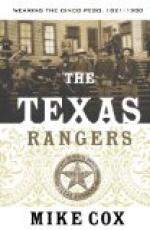The Texan patted the neck of his cow pony, which reached round playfully and pretended to nip his leg. They understood each other, and were now making the best of a very unpleasant situation. Since morning they had been lost on the desert. The heat of midday had found them plowing over sandy wastes. The declining sun had left them among the foothills, wandering from one to another, in the vain hope that each summit might show the silvery gleam of a windmill, or even that outpost of civilization, the barb-wire fence. And now the stars looked down indifferently, myriads of them, upon the travelers still plodding wearily through a land magically transformed by moonlight to a silvery loveliness that blotted out all the garish details of day.
The Texan drew rein. “We all been discovering that Wyoming is a powerful big state. Going to feed me a cigarette, Teddy. Too bad a hawss cayn’t smoke his troubles away,” he drawled, and proceeded to roll a cigarette, lighting it with one sweeping motion of his arm, that passed down the leg of his chaps and ended in the upward curve at his lips.
The flame had not yet died, when faintly through the illimitable velvet night there drifted to him a sound.
“Did you hear that, pardner?” the man demanded softly, listening intently for a repetition of it.
It came presently, from away over to the left, and, after it, what might have been taken for the popping of a distant bunch of firecrackers.
“Celebrating the Fourth some premature, looks like. What? Think not, Teddy! Some one getting shot up? Sho! You are romancin’, old hawss.”
Nevertheless he swung the pony round and started rapidly in the direction of the shots. From time to time there came a renewal of them, though the intervals grew longer and the explosions were now individual ones. He took the precaution to draw his revolver from the holster and to examine it carefully.
“Nothing like being sure. It’s a heap better than being sorry afterward,” he explained to the cow pony.
For the first time in twelve hours, he struck a road. Following this as it wound up to the summit of a hill, he discovered that the area of disturbance was in the valley below. For, as he began his descent, there was a flash from a clump of cotton-woods almost at his feet.
“Did yo’ git him?” a voice demanded anxiously.
“Don’t know, dad,” the answer came, young, warm, and tremulous.
“Hello! There’s a kid there,” the Texan decided. Aloud, he asked quietly: “What’s the row, gentlemen?”
One of the figures whirled— it was the boyish one, crouched behind a dead horse— and fired at him.
“Hold on, sonny! I’m a stranger. Don’t make any more mistakes like that.”
“Who are you?”
“Steve Fraser they call me. I just arrived from Texas. Wait a jiff, and I’ll come down and explain.”
He stayed for no permission, but swung from the saddle, trailed the reins, and started down the slope. He could hear a low-voiced colloquy between the two dark figures, and one of them called roughly:




